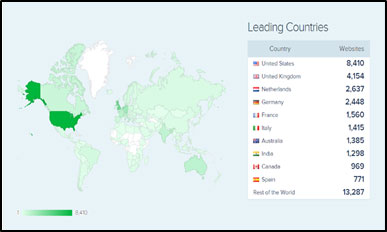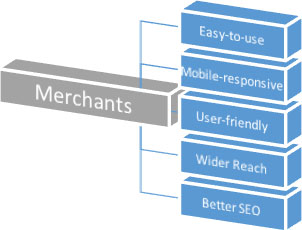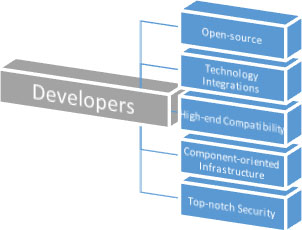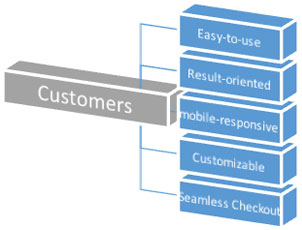
3 min read
Why you Need Magento 2 as your Ecommerce Platform in 2021
Thinking of running a successful e-commerce business in this ever-changing world without having a digital presence is one of the biggest mistakes you can make. With technology offering customers the privilege to buy from the comfort of their homes, owning an online e-commerce store has become the need of the hour.
However, choosing the right technology platform to support your e-commerce store is nothing less than a challenge. This is where ‘Magento’ comes into the picture. Even if you are already into the e-commerce business and looking to migrate to a better option, this open-source e-commerce platform never ceases to amaze you.
Powering over 0.8% of 1.5 billion websites globally (active 200 million), it has emerged as a high-performing solution for retailers, merchants, and established business players. “Magento powers 70 of the top 500 B2C, and 40 of the top 300 B2B companies,” says Internet Retailer’s list of

Here’s a clear depiction of the latest version Magento 2 usage by websites across the globe. While the popularity of Magento 2 across e-commerce and shopping websites is 6.16% that of Magento 1 is 5.88%.
Difference Between Magento 1 and Magento 2
Many e-commerce startups, aggregators, and legacy businesses still do not understand the importance of migrating from Magento 1 to Magento 2. Even if it’s about switching between two versions of one digital open-source e-commerce platform, they find it difficult.
As such, QuanTech Labs brings you some insights to make the best possible use of extensions, resources, community support, and themes for Magento 1 to Magento 2 migration.
| Imperatives | Magento 1 | Magento 2 |
|---|---|---|
| Support | Integrated with traditional technologies of 2009 | Integrated with recent e-commerce developments like UI/UX improvements, code automation, voice search, lean application footprint, etc |
| Architecture | Displays low performance with default versions | Displays high performance with default versions including latest versions like CLI, NGINX, Apache, Composer, Symphony, PHP, etc. |
| Cost | Prohibitive developmental expense | Competitive with customization |
| Performance | Unable to cope with rising demands | Loads 30-50% faster and can handle more orders at the rate of 39% |
| Dashboard | Conventional design | Minimalistic design provides user-friendly navigation and good technology exposure |
| Security | Unstable and vulnerable | Robust stability and security |
Key Magento 2 Statistics
Let’s walk through some significant statistics to understand this open-source e-commerce platform Magento 2 and how can it enhance e-commerce business solutions.
Magento 2 outlines CAPTCHA and WEB APIs to boost contactless payment.
Magento 2 with PHP7 promotes 135K more orders than Magento 1 per hour.
Magento 2 with PHP7 processes 2.1 million catalog view than Magento 1 per hour.
Magento 2 is integrated with Schema.org and unique snippets that improve SERP ranks and SEO.
Magento 2 offers access to 3,875 extensions currently.
Understanding Magento 2 from Different Perspectives
Let’s shed some light on how Magento 2 can offer Merchants, Developers, and Customers a satisfactory end-to-end e-commerce journey.



Top Reasons to Choose Magento 2
The easy-to-use interface and scalability of Magento 2 have already adopted by many businesses. If you’re planning your e-commerce venture or already have one, QuanTech Labs’ pool of Magento 2 Professionals can help you reach your goals with the below.
Customization & Tools – Being an open-source e-commerce platform, Magento 2 offers an array of customization facilities. It effectively supports integration with tools like Inspect Let, Big Commerce Analytics, Google Analytics, etc.
Easy-to-assemble – Accessibility to databases like NoSQL becomes easy with Magento 2 by using third-party tools. Data integration is one of the most important Magento 2 benefits. You can also use cloud services while integrating the data.
API for Inventory – Magento 2 provides application programming interfaces for inventory management. With Magento 2 API routines, you can create stock lists via an encryption scanning device and manage inventory with ease.
Digital Marketing Assistant – Magento 2 is the best e-commerce platform for optimizing your e-commerce store with an in-built digital assistant. It helps in executing and managing business strategies with necessary URL suggestions, Keyword suggestions, etc.
Mobile-friendly Website – You can gain a competitive edge with Magento 2 mobility features. It offers an amazing mobile-friendly e-commerce platform where all the stakeholders can hover and scroll with utmost convenience.
Safe & Reliable – Magento 2 has exceptional potential to offer high-level security to your online e-commerce network. What makes it less vulnerable than the previous version Magento 1 is its arrangement along with five folders in the root directory.
Run Several Websites via Single Backend – You can setup multiple websites in Magento 2 with the same backend. You can have different stores across the globe with a different configuration, data inputs, and domain name accordingly.
So, are you thinking of starting your own e-commerce business in 2021 and don’t know how to begin? Choosing the right technology platform to migrate is becoming difficult. Forget all your worries as QuanTech Labs is here to give wings to your e-commerce dream.